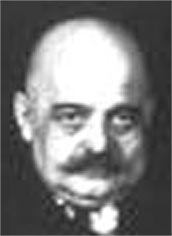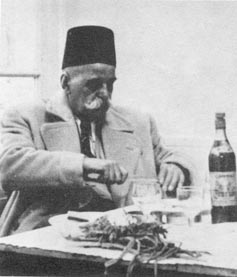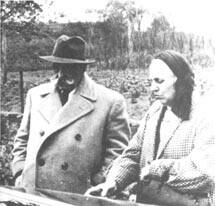Gurdjieff
 George Ivanovich Gurdjieff was probably born in 1877 in Alexandropol in Russian
Armenia. His father was Greek, his mother Armenian. Armenian was spoken at home, but he also learned some Greek, Turkish and local dialects. Throughout his public life he spoke
Russian and English badly so whatever Mastery he may later have attained was obviously not linguistic.
He founded a movement based on doctrines of enlightenment through meditation and heightened self-awareness as publicised by his one-time disciple Ouspensky and attracted many prominent followers mainly from a literary, theosophical or Jungian background in
Europe and the United States.
George Ivanovich Gurdjieff was probably born in 1877 in Alexandropol in Russian
Armenia. His father was Greek, his mother Armenian. Armenian was spoken at home, but he also learned some Greek, Turkish and local dialects. Throughout his public life he spoke
Russian and English badly so whatever Mastery he may later have attained was obviously not linguistic.
He founded a movement based on doctrines of enlightenment through meditation and heightened self-awareness as publicised by his one-time disciple Ouspensky and attracted many prominent followers mainly from a literary, theosophical or Jungian background in
Europe and the United States.
It is difficult with many 'gurus' to determine if they are honest and sincere in their lives and teachings. With Gurdjieff there is no such difficulty. He was a self-proclaimed liar and cheat who delighted in recalling, if nor embellishing, his successful criminal frauds. He was dictatorial, a heavy drinker, especially Armagnac, used opium and took full sexual (ab)use of his female disciples and fathered many children by them. He was a successful professional hypnotist. His personal habits could be disgustingly dirty and he quarrelled and broke with all his major male disciples.
 Gurdjieff (right when working as a professional hypnotist)
established himself as a guru in Moscow in 1912 amongst the many theosophists and others interested in the occult as Tsarist society careered to its downfall five years later. His
esoteric knowledge and status were attributed to his discoveries during travels in Central Asia, related in his book Meetings with Remarkable Men, which, however, is
contradictory and unreliable. It is claimed he even spent time in a Tibetan monastery.
Gurdjieff (right when working as a professional hypnotist)
established himself as a guru in Moscow in 1912 amongst the many theosophists and others interested in the occult as Tsarist society careered to its downfall five years later. His
esoteric knowledge and status were attributed to his discoveries during travels in Central Asia, related in his book Meetings with Remarkable Men, which, however, is
contradictory and unreliable. It is claimed he even spent time in a Tibetan monastery.
His teachings were singular and unusual amongst systems of thought asserting the possibility of transcendence of the normal human condition. They were influenced by middle eastern Sufi thought but were strongly individualistic and lacked a moralistic or ethical basis. While claiming that no human progress can be accomplished except on an individual basis there was a very strong stress on group work under his personal tuition and control.
 Gurdjieff moved to Tiflis in Georgia and then to Constantinople and on to Berlin after
the Russian revolution of 1917. He was not allowed to settle in England but with money from Lady Rothermere, the estranged wife of the newspaper magnate, and other wealthy English
supporters, the 'Institute for the Harmonious Development of Man' was set up at the Chateau du Prieure, a large estate near Fontainebleau, in France in 1922. Here he collected his
disciples for full time involvement in 'The Work'. There were 60 to 70 inhabitants at the Institute, half of these were Eastern
Europeans who were kept separate from the English speaking residents who were from social groups that were completely inexperienced with all forms of manual and craft work.
Gurdjieff worked them hard, kept them hungry, sometimes fasting, and did not allow much sleep and often insulted them bitterly. The residents soon began that form of intense
magical thinking that places all power and meaning into the guru's every mundane action no matter how paradoxical or complex these concepts must become. In 1924 Gurdjieff went to
the USA with a troupe of his movement performers but shortly after his return he drove, probably drunk, into a tree at 90kph - he was a very bad and dangerous driver - and was
seriously injured. No mention by Gurdjieff or his followers has ever been made of the tree's suffering and injuries. On recovering he sent most of the inhabitants packing and
concentrated on writing for the next few ars while being supported by his USA followers. At this time his wife died despite "the prodigious effort he made to cure his wife's
cancer by a technique learned in Central Aisia that made use of astral power". He spent the next few years concentrating on dictating "All and Everything Beelzebub's Tales to His
Grandson".
Gurdjieff moved to Tiflis in Georgia and then to Constantinople and on to Berlin after
the Russian revolution of 1917. He was not allowed to settle in England but with money from Lady Rothermere, the estranged wife of the newspaper magnate, and other wealthy English
supporters, the 'Institute for the Harmonious Development of Man' was set up at the Chateau du Prieure, a large estate near Fontainebleau, in France in 1922. Here he collected his
disciples for full time involvement in 'The Work'. There were 60 to 70 inhabitants at the Institute, half of these were Eastern
Europeans who were kept separate from the English speaking residents who were from social groups that were completely inexperienced with all forms of manual and craft work.
Gurdjieff worked them hard, kept them hungry, sometimes fasting, and did not allow much sleep and often insulted them bitterly. The residents soon began that form of intense
magical thinking that places all power and meaning into the guru's every mundane action no matter how paradoxical or complex these concepts must become. In 1924 Gurdjieff went to
the USA with a troupe of his movement performers but shortly after his return he drove, probably drunk, into a tree at 90kph - he was a very bad and dangerous driver - and was
seriously injured. No mention by Gurdjieff or his followers has ever been made of the tree's suffering and injuries. On recovering he sent most of the inhabitants packing and
concentrated on writing for the next few ars while being supported by his USA followers. At this time his wife died despite "the prodigious effort he made to cure his wife's
cancer by a technique learned in Central Aisia that made use of astral power". He spent the next few years concentrating on dictating "All and Everything Beelzebub's Tales to His
Grandson".
 In 1930 he forced a humiliating public break with his major US follower, A.R.
Orage, and declared all Gurdjeffian groups to have gone mad. Near the same time Ouspensky announced a complete break with Gurdjieff who he said had
either gone mad or evil. US money was in short supply after the crash of 1929 and because of his improvidence the Chateau du Prieure was foreclosed and sold in 1933. By the time
of his visit to New York in 1934 he was in ill health, had grown very fat and looked terrible. After this nadir in his life things improved with a smaller group of followers
always on hand with new people gradually replacing those that left. He spent more time making his living as a controversial 'healer' and hypnotic rehabilitater of drug addictions.
However, he was unable to cure Katherine Mansfield who died of TB at the Chateau, his wife or his mother despite prodigious "astral" efforts and was addicted to tobacco, alcohol
and was often obese.
In 1930 he forced a humiliating public break with his major US follower, A.R.
Orage, and declared all Gurdjeffian groups to have gone mad. Near the same time Ouspensky announced a complete break with Gurdjieff who he said had
either gone mad or evil. US money was in short supply after the crash of 1929 and because of his improvidence the Chateau du Prieure was foreclosed and sold in 1933. By the time
of his visit to New York in 1934 he was in ill health, had grown very fat and looked terrible. After this nadir in his life things improved with a smaller group of followers
always on hand with new people gradually replacing those that left. He spent more time making his living as a controversial 'healer' and hypnotic rehabilitater of drug addictions.
However, he was unable to cure Katherine Mansfield who died of TB at the Chateau, his wife or his mother despite prodigious "astral" efforts and was addicted to tobacco, alcohol
and was often obese.
 He lived in Paris and collaborated with the German occupation without qualms. He
obtained credit from various food shops by persuading them that an American pupil had given him a share in a Texan oil well which would ensure that their bills would be paid as
soon as the war was over. This was metaphorically true though a sheep farm would have been more apt. Sure enough after the war the sheep arrived and the shopkeepers were paid.
He lived in Paris and collaborated with the German occupation without qualms. He
obtained credit from various food shops by persuading them that an American pupil had given him a share in a Texan oil well which would ensure that their bills would be paid as
soon as the war was over. This was metaphorically true though a sheep farm would have been more apt. Sure enough after the war the sheep arrived and the shopkeepers were paid.
After Ouspensky's death there was a resurgence of contact with Gurdjieff and his British followers and those of JG Bennett. In the disciples talks together it appeared that there was a different Gurdjieff for every disciple. This was explained as Gurdjieff's mastery over Maya rather than as each pupil's individual expectation transforming their perception. They couldn't even agree as to the actual events of a dinner, often flatly contradicting each others' accounts. His mastery did not prevent his arrest for currency crimes as he was too slapdash to take even normal precautions. This was interpreted as a spritual need of his to be imprisoned. After Gurdjieff's death the various leaders of groups once again broke up in discord and inability to cooperate. Many followers believed that another teacher would appear to carry on his work.
He died on October 29th, 1949.
Gurdjieff's writings apart from 'Meetings with Remarkable Men' are what is popularly called unreadable. Even his devotees say that All and Everything has to be read several times if its meaning is to be grasped; and some claim that Gurdjieff's obscurity was deliberate; a device adopted to ensure that the disciple would have to make a considerable effort at understanding on his own account rather than be spoon-fed with clear statements and doctrines.
 This is typical of the complex web of explanation that is often required when a
guru's actions are explained by his followers. In Gurdjieff's case this is simplifed because there is no dispute that he was often cruel, arbitrary, dictatorial, fraudulent,
sexually predatious, dangerous, dishonest, bombastic, etc, etc, etc. His life apart from his gurulike activities seems humdrum - long hours in cafes, lots of driving excursions
and picnics, very heavy consumption of alcohol and extravagant feasting. His system of thought and teaching, at least that part of it that was public and recorded, was not of a
high quality and the results amongst his followers was not impressive - most seemed to function more poorly after their contact than before and their interpersonal relationships
were extremely disharmonious. He did not ascribe to the normal ethical values of society and especially not to the even stricter values usually expected of spiritual masters. His
actions were often those of the criminal underclass and raised the question just how the life of a self proclaimed Master - someone who claims to have attained to a super human
consciousness - can be assessed.
This is typical of the complex web of explanation that is often required when a
guru's actions are explained by his followers. In Gurdjieff's case this is simplifed because there is no dispute that he was often cruel, arbitrary, dictatorial, fraudulent,
sexually predatious, dangerous, dishonest, bombastic, etc, etc, etc. His life apart from his gurulike activities seems humdrum - long hours in cafes, lots of driving excursions
and picnics, very heavy consumption of alcohol and extravagant feasting. His system of thought and teaching, at least that part of it that was public and recorded, was not of a
high quality and the results amongst his followers was not impressive - most seemed to function more poorly after their contact than before and their interpersonal relationships
were extremely disharmonious. He did not ascribe to the normal ethical values of society and especially not to the even stricter values usually expected of spiritual masters. His
actions were often those of the criminal underclass and raised the question just how the life of a self proclaimed Master - someone who claims to have attained to a super human
consciousness - can be assessed.
The simplest explanation is that Gurdjieff was a "hypnotic" charlatan who preyed on a vulnerable section of society who could afford to support his confidence tricks. There may not be enough cyberspace to display the many and lengthy explanations that his followers and followers' followers have convoluted. Once you enter a world where nothing may be as it appears, where everything may be occurring on many different levels, when anything may actually be it's opposite, then it is no longer possible to know anything any more, least of all the premises you accepted before entering such a paradoxical maze.
 In a meaningless human life in a meaningless universe you might just as well spend your life with an amusing, interesting, puzzling and never boring guru and then you die. But only people who think there are higher potentialities and meanings are attracted to gurus like Gurdjieff.
In a meaningless human life in a meaningless universe you might just as well spend your life with an amusing, interesting, puzzling and never boring guru and then you die. But only people who think there are higher potentialities and meanings are attracted to gurus like Gurdjieff.
Madame de Salzmann (seen left with Gurdjieff) took control of a large group of his followers on his death.
The major internet page devoted to Gurdjieff is probably www.gurdjieff.org/.
As far as I am aware there are no internet pages of ex-Gurdjieff survivor organisations as these events occurred in pre-cyperspace times. There are small groups scattered throughout the world believing they are carrying on "The Work", they are usually based around a leader who claims some direct transmission from Gurdjieff or one of his followers. They are exclusive and usually have strict criteria re age and wealth for prospective members.
- Meetings with Remarkable Men
G. I. Gurdjieff - The Harmonious Circle
James Webb
Exhaustive biography of Gurdjieff and history of his work and followers. As life around Gurdjieff was anything but harmonious it's title seems curiously inapt. Webb was a "searcher" rather than an academic and unfortunately later resolved his personal problems with the direct application of a shotgun cartridge to his mind. - Gurdjieff Making a New World
John G. Bennett
A good example of the complex, tortuous and ingenious arguments that explicators of Gurdjieff's life and teachings adopt in an attempt to explain his actions. There are probably more of Bennett's ideas in this book then Gurdjieff's. - Gurdjieff The War Against Sleep
Colin Wilson
A short, entertaining but very credulous account of the Gurdjieff legend. It includes such claims as 'Gurdjieff made the same kind of impression on everyone who met him' after quoting one of his followers that after meeting Gurdjieff she 'was at last in the presence of a true Guru.' The overwhelming majority of people who met Gurdjieff were unmoved or negative else he would have been more than a very minor part in the literary-bohemian-religious history of the 20th century. The normal response to Gurdjieff and his followers was that the followers acted like zombies and Gurdjieff was a sinister Svengali.
Wilson claims that "Gurdjieff's system is probably the greatest single-handed attempt in the history of human though to make us aware of the potential of human consciousness" but also "corrects" and "extends" Gurdjieff's ideas with his own interpretations which are based on left brain-right brain ideas and the hope that because humans can in moments of crisis act with more than normal power they could extend this intensity into their whole lives. Wilson in a book 1/10th the size of Webb's resorts to nearly as many circumlocutions as Webb and Bennett together to show Gurdjieff and his actions in a positive light. While Wilson is obviously an admirer of Gurdjieff his honest portrayal of the effects (or lack of them) of Gurdjieff's "training" on his followers and Gurdjieff's and Ouspenky's unhappy old age displays the truer "existential" emptiness of Gurdjieffiania. - Feet of Clay - A Study of Gurus
by Anthony Storr
An interesting, sympathetic examination of the concept of guruship from a modern neo-Freudian analyst and author with a less that sympathetic Chapter on Gurdjieff. - Cults of Unreason
by Christopher Evans
A fuller, skeptical, amusing account of Gurdjieff from the above book.
Back to Gurus Page.